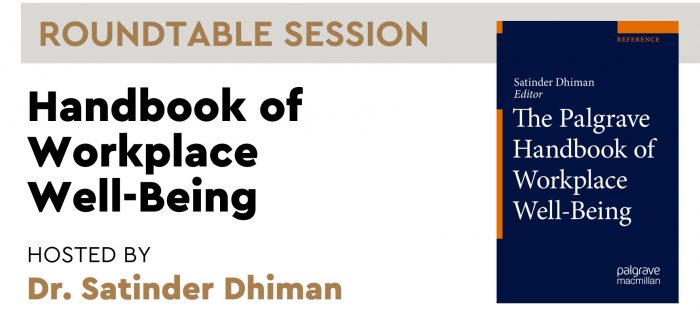School of Business Hosts Roundtable to Review Associate Dean/MBA Chair’s Handbook

The School of Business Dean’s Office organized a successful roundtable session on March 3rd to celebrate a major reference work, recently published under editorial supervision and coordination of Dr. Satinder Dhiman. Dr. Dhiman, who serves as Associate Dean and MBA Chair in the School of Business, shared excerpts of this major work, along with 11 of the 94 contributing authors.
From an overarching viewpoint, the 55 chapters in this major reference work, published by Palgrave, propose best practices in managing and leading the 21st century workforce. The work offers a great combination of strategies and tools to cultivate well-being in the present day boundary-less work environment, and provides valuable insights into why employee well-being is such a powerful driver of employee performance and engagement and what organizations can do to enhance workplace well-being and fulfillment.
Dr. Dhiman, who contributed several chapters to this work, discussed a chapter titled, “Being Good and Being Happy: Eudaimonic Well-Being Insights from Socrates, Plato, and Aristotle,” which garners the view that moral virtue is the gateway to happiness and that being good and being happy are vitally interlinked. He also discussed, “More than Happiness: A Stoic Guide to Human Flourishing,” presenting the ethical philosophy of Stoicism as a guide to personal and professional flourishing and well-being.
Dr. Joan Marques, Dean of the School of Business, and contributing author to this work, discussed her chapter, “How Wakeful Leaders Create Flourishing Workplaces,” by explaining two models: The macro-to-micro approach, which prioritizes collective wellbeing over individual focus, and the concept of ecumenical learning, which ensures optimal constructive learning among all stakeholders in an organization.
Dr. Gary Roberts, Professor of Government at Regent University, emphasized that employee well-being is a global construct reflecting the overall physical, mental, and spiritual health of employees. In a review of his chapter, “Fostering Workplace Well-Being Through Servant Leadership,” he discussed a large cluster of servant leader empirical studies and shared highlights of the evidence of its efficacious influence on employee well-being.
Dr. Branka Olson, Assessment Officer in Woodbury’s School of Architecture, discussed her co-authored chapter, “Improving the Quality of Work Life: An Interdisciplinary Lens into the Worker Experience,” explaining that humans are now, more than ever, becoming knowledge workers needed for the power within their minds, and that organizations can no longer ignore the well-being of workers if they want to succeed in a globally competitive environment.
Dr. Petros Malakyan, Department Head of Communication and Organizational Leadership at Robert Morris University, shared pointers from his co-authored chapter, “Diverse Personalities, Egos, Roles, and Relations: Toward Workplace Wellbeing,” and presented approaches to workplace wellbeing, which assume diverse intrapersonal and interpersonal perspectives and provide varying yet connected theoretical understanding and practical implications for a workplace wellbeing located at both the individual and organizational level.
“Seeking Meaning for the Contemporary Workplace: Insights from the Desert Fathers and Mothers” was the title of a chapter discussed by Drs. Michael R. Carey and Dung Q. Tran, both affiliated with Gonzaga University. These authors accentuated that the concept of purity of heart, developed in the early years of Christian monasticism, has much to offer leaders and scholars of leadership, not only in understanding “the way things really are” in organizations but in how personal well-being is connected to community well-being, and vice versa.
In sharing highlights of his co-authored chapter, “Yoga Sutras and Well-Being”, Dr. Anil Maheshwari, professor of Management at Maharishi University of Management, briefly described the eight limbs of Yoga Sutras that provide well-being at the level of the individual as well as the society. He also shared case studies of yogis creating collective well-being using parts of the Yoga Sutras in unique entrepreneurial ways to achieve success for whole societies.
Zahra Bhojani, PhD candidate at the University of Guelph, discussed her co-authored chapter, “Sustainable Happiness, Well-Being, and Mindfulness in the Workplace,” presenting an overview of a decade of literature that has explored linkages between mindfulness practice, subjective well-being, decision-making, integrative thinking, sustainability, and sustainable happiness from the individual to the societal level.
Dr. Meera Algaraja, Associate Professor at the University of Louisville, presented her chapter, “Wellbeing in the Workplace: A New Conceptual Model and Implications for Practice,” in which she offers a new model that offers implications for managers as they harness the full potential and value of their employees by developing and deploying practical strategies for workplace wellbeing.
Dr. Claude-Hélène Mayer, Professor in Industrial and Organizational Psychology at the University of Johannesburg, shared some pointers from her co-authored chapter, “What Contributes to Family Therapist Trainees’ Health? An Investigation into the Context of Professional and Workplace Health and Well-Being,” which aims to contribute to a discourse on the development of subjective, personal health concepts and their impact on the development of a broader organizational culture of health and well-being.
Last Updated on March 11, 2021.